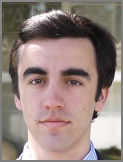

Peter Crane ’15, a history and economics double major, is writing his senior thesis on debates over secularism in Pakistan immediately following its partition from India. His thesis advisor is Assistant Professor of Asian Languages and Civilizations and History Dwaipayan Sen.
Q: What is your thesis about?
A: My thesis is about debates on secularism in Pakistan between 1947 and 1949, the first two years of the country’s existence. I am particularly looking at this one bill passed by the legislature called the “objectives resolution,” which is sort of a non-binding resolution on the objectives and goals that the newly formed state should have.The big founder, the father of the nation [M.A. Jinnah] had died a year into the country’s founding in 1948, so the new country didn’t have a very concrete set of goals on a lot of things, including the extent religion should play a role in governance. Around 14 to 15 percent of the country was Hindu and there were still religious minorities, even though Pakistan was created sort of for religious reasons. There were a lot of ideological discussions and debates, but also more blunt mechanisms of just political power — who is in control and who is grappling for power.
Q: What was your pre-writing process like? What kind of research did you do?
A: I first met with professors, including Professor Monica Ringer. She knows a lot about ideological debates between secularism and Islam, whereas Dwaipayan Sen is more geographically linked to what I do. I had been talking to them about these interests. I was actually interested in different things because a lot of what happens [with] thesis writers is sort of they have one interest, they read about it and there’s this other thing that they actually want to go to. A big part was just reading the general history of the country and starting to narrow it down. I [first] wanted to look at between 1947 and 1956, then it was between 1947 and ’53, and now it’s between just 1947 and 1949. Once you’ve really decided [on the topic], then you really drill into that, and that means first mastering the secondary sources, seeing what people have written before and then going to their footnotes. This involves a lot of research techniques I hadn’t used before, using inter-library loan and getting archival documents. I have four feet of books of parliamentary procedure and debate for the country for three years that has to be kept in the archives.
Q: What kind of background knowledge did you have on the topic?
A: The first course that linked me to this type of thinking was this course co-taught by Monica Ringer and a professor named Trent Maxey, who taught a class on the idea of religion as a colonial, exported product. Also, I had a survey course with Professor Sen on South Asian history, which involved a lot of Indian history, but also partition and a few issues with Pakistan. [The course] combined those theoretical discussions with that geographic context.
Q: What’s the timeline for your overall writing process?
A: The goal is to have two chapters [out of three] by the end of the semester. One chapter is the minimum. The deadline is one chapter by Dec. 8. Then, in mid to late February, the whole thing is due, so that means doing a lot of things over interterm. And then it’s a month or two of sheer editing. Then, some time in April, you start working on your oral presentations.
Q: What is your favorite part of the thesis writing process?
A: It is going through the archival documents, like the constituent assembly debates and seeing things people haven’t talked about before. A lot of people assume Pakistan is a Muslim country, it’s always been homogeneous, [and] people correlate it with terrorism and things like that, [but] in the first two years of the country, a lot of things were very different. Looking at the actual documents and seeing, well, they actually cared about things that aren’t talked about anymore or are forgotten — that’s a cool part.
Q: What is the hardest part of the process?
A: [Many] studies in this area have not been completely thorough, so a lot of times, I’ll be reading things and they won’t be well cited, and I’ll go to the few citations they have and [they] won’t be well supported by the evidence or the evidence is hard to find. You are kind of on your own when you venture into this area, and that’s good because everything you find is an original discovery, something you can contribute, but it’s also very hard because you’re putting a lot more time into researching than actually analyzing.
Q: Who or what have been your best resources throughout the process?
A: Definitely my advisor. One, he’s just a complete master of that area and that time period especially, and he’s been able to point me to places to look, because a simple Google search of something like that is not going to tell you the right places to find certain things. If I say, “What were the biggest newspapers in East Bengal in the 1940s?” he would know. Also, the library has been super helpful. Apparently I have a reputation in the inter-library loan office just because of the sheer volume of stuff I’ve been getting.
Q: If you had any advice for future thesis writers, what would it be?
A: Make sure you decide to do something you like first before you decide to do a thesis. A lot of people decide to do a thesis, and then pick a topic second, and then just kind of muddle through something. To really have that relentless drive, you need to be passionate about something.